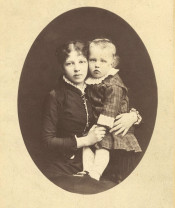
The Presidential Library portrays Alexander Blok and his mother
“My mother and me are almost the same...” - said the famous Russian poet of the XX century Alexander Blok, whose birthday this year symbolically coincides with the annual Mother's Day - November 28. The Presidential Library’s portal features the collection Alexander Blok (1880-1921), which includes digital copies of rare lifetime editions of the writer, memoirs of contemporaries, photographs of Alexander Blok and people of his entourage.
There is hardly an example of such a strong mutual connection between the poet and his mother, not only spiritual, but also creative, in the history of Russian literature. The personality of Alexandra Beketova, the daughter of a Russian botanist, professor and rector of the Imperial St. Petersburg University, undoubtedly had a great influence on the formation of the future Symbolist poet. “In addition to her great love, Alexandra Andreevna put the traits of her nature into her son. Mother and son were similar in many ways. Increased impressionability, tenderness, passion, extreme nervousness, a penchant for mysticism and a philosophical deepening of life phenomena - all these are features inherent in both of them”, - writes her sister Maria Beketova in her book Alexander Blok and His Mother: Memoirs and Notes (1925).
Alexander Blok was affectionately called Biboy by his mother in early childhood. Throughout her life he was her exceptional, deepest and strongest affection. All maternal tenderness and love were concentrated on him, which only became stronger over the years.
Blok grew up in the atmosphere of the rector's house, in which literature was treated with reverence, the works of classics and modern writers were often discussed, quoting poems and prose. The book Alexander Blok in the Memoirs of his Contemporaries and his Letters (1924) illustrates the relationship between Blok and his mother.
Being by nature primarily a mother, she wrote fairy tales for her Sasha, which he loved very much and very soon, at the age of 7, he himself began to compose short stories, poems, puzzles, composing albums and magazines from them. One of such collections, consisting of a quatrain and a rebus, is called Mamulin Album, on its last page is carefully written "I love my Mommy very much". In addition to this record, on it with the hand of the mother, who tremblingly celebrated the success of the child, the signature is 8 years old. Another book, also written for his mother, says in block letters: For my baby, below - For my little baby. All these childish efforts show boundless tenderness and affection for the mother, whom in one of the children's letters he called my little drop.
The piles of their letters to each other are proof of this closeness. Even in adulthood, Alexander Blok treated his mother with great love and warmth, trusting her both the first reading of his poems and heartfelt feelings, always finding support and understanding from her.
Blok always highly appreciated the professional opinion of the mother about various literary works. Having already become a well-known poet, literary figure, Alexander Blok entrusted her with a summary of some of his works in the Extraordinary Commission of the Provisional Government, of which he was the editor after accepting the 1917 revolution.
The difficult character of Alexandra Andreevna consisted of many contradictions. She was a very complex, sensitive and nervous person, and at the same time, she was always a universal favorite. And being a mother of the famous St. Petersburg poet, possessing an exceptional closeness with him, an understanding of his work, and as a woman with an original mind, she aroused the desire of all his friends to seek rapprochement with her. Even after the death of Blok himself, the poet's friends did not forget his mother.
Blok's mother survived her son by only a year and a half. “Her life after this loss was so painful that only a highly understood sense of duty to the memory of her son and obedience to a higher will kept her from committing suicide”, - recalled Maria Beketova in her book Alexander Blok and His Mother: Memoirs and Notes (1925). These difficult years Alexandra Andreevna continued to work tirelessly, rewriting whole volumes of her son's manuscripts. “We buried Blok's mother, according to her behest, in front of her son’s grave. Their crosses look at each other, and according to her will, found in her desk, her cross bears the surname of not only her second, but also her first husband, in order to perpetuate her involvement with her son, her dear child even after death".

